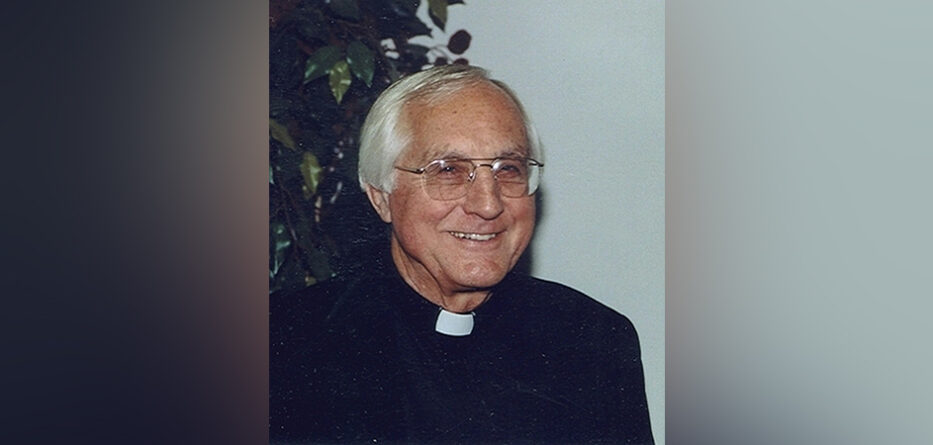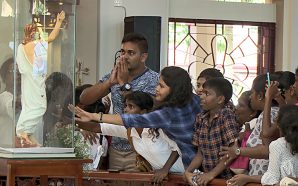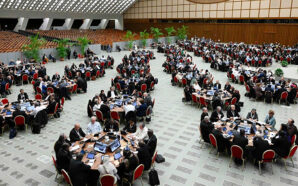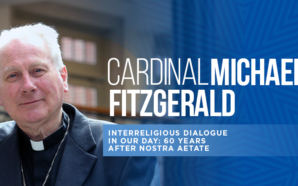Bishop Thomas Gumbleton, a quiet but determined champion of people on the margins, has died at age 94 in his native Detroit.
Bishop Thomas Gumbleton was living among, and advocating for, some of the most marginalized people in society and the Church long before Pope Francis made “going to the peripheries” Catholicism’s preeminent leitmotiv.
In fact, Jorge Mario Bergoglio (the pope’s Christian name) was not even a priest yet when Gumbleton was ordained to the episcopacy back in 1968. Tom, who would have marked his 56th anniversary as a bishop on May 1st, died on Easter Thursday at the age of 94. At the time of his death, he was the most senior member of the US Catholic hierarchy. Only ten other men in the entire world had been a Catholic bishop longer.
Tom was just 38 when Paul VI named him an auxiliary bishop for the Archdiocese of Detroit, making him the youngest member of the US episcopate at the time. And he would remain an “assistant” bishop in his native Michigan city for the rest of his life. That had not been Cardinal John Dearden’s plan when he asked the pope to make Gumbleton his auxiliary. Dearden, who did not get the red hat until April 1969, relied heavily on the young bishop in his efforts to implement the reforms of the recently concluded Second Vatican Council (1962-65).
The cardinal, who had been known as “Iron John” and a strict law-and-order bishop before his “conversion” during Vatican II, had hoped Gumbleton would eventually be given the chance to lead his own diocese. But that never happened. Dearden retired in 1980 and, several months later, John Paul II named a Polish-American bishop from northern Michigan by the name of Edmund Szoka as Detroit’s new archbishop. Cardinal Szoka wanted nothing more than to get Gumbleton out of his hair and made an ordinary. But despite his closeness to the pope, Rome would have none of it.
A gentle man fiercely promoting peace and justice
Detroit’s eternal auxiliary bishop had already made a name for himself shortly after his episcopal ordination as the US Church’s leading critic of America’s involvement in the Vietnam War. “Our participation in it is gravely immoral,” he said in an article in The New York Times. “When Jesus faced his captors, he told Peter to put away his sword. It seems to me he is saying the same thing to the people of the United States in 1971,” the bishop wrote. At the time, he had just become the founding president of Pax Christi USA. That post gave him an expanded role in advocating, not only for peace, but many other social justice issues. And it made him enemies among some in a hierarchy that would steadily become more conservative under John Paul.
Tom Gumbleton was a friend and defender of the poor, the imprisoned, and the sexually abused, as well as those discriminated against because of their skin color, sexual orientation or female gender. Cardinal Szoka and his successors marginalized Gumbleton to the point that he eventually became the pastor of a parish of Detroit’s poorest and most run-down urban neighborhoods. He was still living there in a nearby apartment up to the day he died.
“Bishop Gumbleton paved the way for Pope Francis,” said Frank DeBernardo, executive director of New Ways Ministry, in a statement this week. “Decades before this pope’s openness, when a Catholic leader’s support for LGBTQ people could negatively affect one’s stature in the Church, Bishop Gumbleton spoke fearlessly with compassion and certainty that were rooted in a deep commitment to the Gospel of Jesus.” DeBernardo said Gumbleton “did more than any other member of the hierarchy to move Church members, theologians, and pastoral ministers to extend a friendly and welcoming hand to LGBTQ people”.
“Elephants in the Room”
Tom was not gay, but his brother was. And this caused their mother much grief. The bishop told me she asked him if her homosexual son would go to hell. This disturbed him, too, and that, it seems, is when he got involved in what some might call “gay ministry”. Like everything he did, Tom sought to be part of the issue by listening. He was a great listener. And a very gentle man with a good sense of humor. The wide circle of friends he formed loved him with a singular devotion. His “Elephants in the Room” lecture series and discussion group gave hope and energy to Catholics who were struggling to make sense of a Church that was becoming more closed in on itself and was shaken by the seemingly never-ending clergy sex abuse crisis.
The Elephants introduced me to some of Tom’s friends and, it was through the lecture series, that I got to know him a bit. Unfortunately, it was only about a decade ago when that happened. I wish I had had the privilege of knowing him longer. I had actually heard him speak about peace building and conscience objection to war back in the mid-1980s when I was in university. His arguments seemed almost too simplistic at the time, but when he spoke to some of us privately afterwards, he gave me the impression of someone who had “been to the mountain”, as it were. How ironic that he died on April 4, the same day Martin Luther King Jr. did in 1968, just a month before Tom was ordained bishop.
“He never had more than a bed, a chair and a dresser”
“He always remembered to be grateful. He had such conviction that when you’re in his presence, you thought ‘Wow he’s the real deal’. The people loved him, who didn’t?” said Bishop Don Hanchon, another retired auxiliary of Detroit. In an interview with The Detroit News this week, he praised Gumbleton for his witness. “He never lived in a place that had more than a bed, chair, dresser… People would be jarred to know how simple of a life he lived,” Hanchon said. “I remember in 2010, he established a link to a very poor community in Detroit that had nothing more than a health clinic and he was committed to seeing it improve throughout his whole life and as Detroit changed.”
Back in September 2016 there was speculation that Pope Francis was about to announce plans to create more new cardinals. And someone in Detroit — where it was rumored that there would never be a cardinal again — wrote an article suggesting the pope give the red hat to current archbishop, Allen Vigneron. The author argued that Detroit, once the powerful center of the auto industry, was now part of the rust belt and was one of the poorer cities in the United States. In other words, Motown was part of the pope’s beloved “peripheries”.
In a half-joking way, I wrote that if Francis wanted to give Detroit a cardinal for this reason it might be more poignant for him to choose someone who has also suffered humiliation and marginalization in his own person, say, by men more powerful in the episcopate. How about someone who has been a courageous witness to the cause of peace and a firm opponent of war and violence of any type and for any reason? The obvious choice was Bishop Gumbleton, I wrote. He was already 86 years old, so the pope wouldn’t even have to sacrifice one of the 120 voting slots, the current nominal cap on the number of electors. If Detroit gets another cardinal, I argued, it should be a true “Francis bishop” who was such even before it became ecclesiastically fashionable or beneficial to career advancement.
In fact, the announcement came a few weeks later. And to no one’s surprise, Tom Gumbleton was not on the list, even though four other men over the age of 80 were. Among the thirteen new cardinal-electors who would end up getting the red hat at that November 19, 2016 consistory, were three other American citizens — Blase Cupich, Archbishop of Chicago; Joseph Tobin, Archbishop of Newark (NJ); and Kevin Farrell, the Irish-born head of the Vatican’s office for laity and the family. Tom, meanwhile, found it humorous that I threw his name in the ring. And a good sense of humor he certainly had!
Definitely a winner
In September 2019, while back in Michigan to visit some family, he invited me to go to a Detroit Tigers afternoon baseball game. The New York Yankees were in town and he said he had a friend who could get us good tickets. “Tom, anybody can get good tickets these days,” I said. “This is about the worst season in Tigers history!” But they were good seats, close to the field.
We went to the game with Sue Sattler, an Immaculate Heart of Mary Sister who lived a few doors down the street from the bishop (whose blood sister is also an IHM). When Tom came out of his house, he had a Tigers ball cap on (as I did, too). Then Sue noticed he was wearing a Yankees t-shirt under his buttoned shirt. “Tom, you’re a traitor!” she said. “No, Sue, I’m a winner,” he said with a glimmer in his eye. “You see, if the Tigers win, I win. And if the Yankees win, I also win.”
Yes, Bishop Thomas Gumbleton was definitely a winner in my book — not in the ways of the world and certainly not in the ways of our often far too-worldly Church. Although he was sometimes misunderstood and even maligned, one has the sense that his stature quietly grew over time even among those in the Church who saw him unfavorably as a progressive or liberal. Perhaps the statement that Archbishop Vigneron graciously issued immediately after Tom’s death highlights this best.
“Bishop Gumbleton was a faithful son of the Archdiocese of Detroit, loved and respected by his brother priests and the laity for his integrity and devotion to the people he served,” he said. “We in the archdiocese join his family and friends in praying for the repose of his soul and asking God to grant him the reward of his labors.”
Reproduced with permission from La Croix International.








